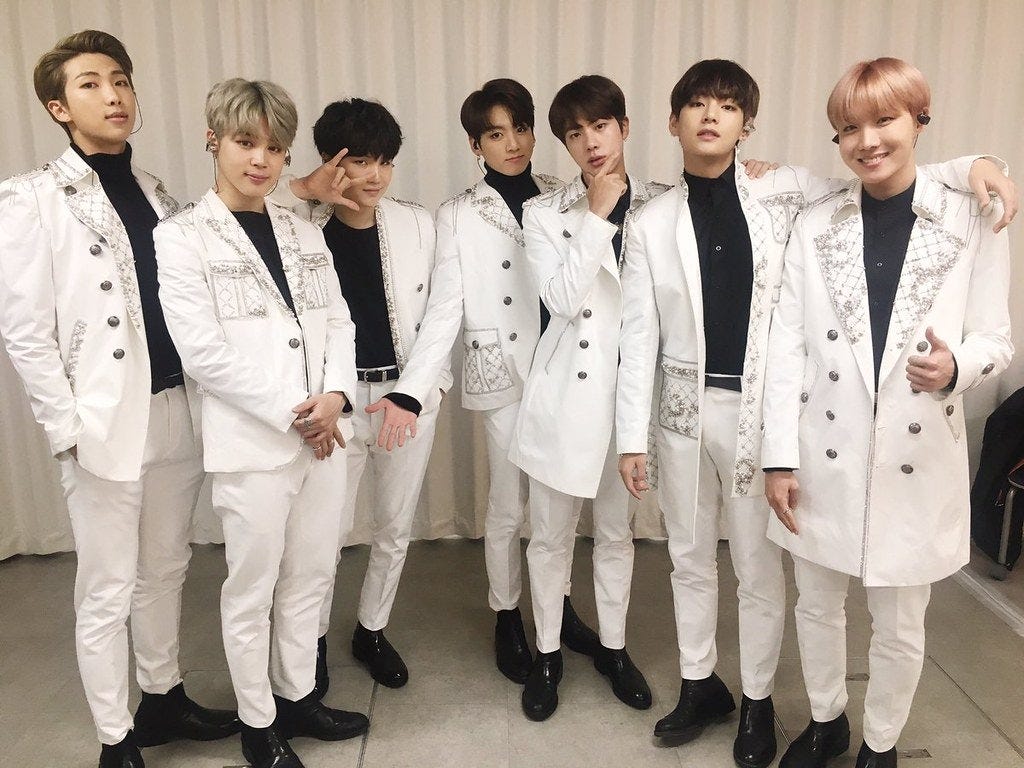Emerging Markets Daily - June 2
Brazil Robust Recovery, Hong Kong Property Soaring, Football and the 'Asian Fan,' Cellulant's Africa Expansion, Iran Low Voter Turnout Expected, BTS and K-Pop's Resilience
The Top 5 Emerging Markets Stories from Global Media - June 2
Editors Note: Daniel Yergin: “The New World Has a New Terrain”
Emerging World - Featured Interview
Emerging World recently interviewed Daniel Yergin. The Pulitzer-Prize winning author talked about the new maps of energy and geopolitics, the writing process, his artist mother's influence, China-US showdown, and what he's learned as an entrepreneur.
An excerpt below:
“My conversation with Daniel Yergin began, appropriately, with the intersection of energy and geopolitics. After all, the New York Times called him “America’s most influential energy pundit” and Time Magazine said, “If there is one man whose opinion matters more than any other on global energy markets, it’s Daniel Yergin.” And that is exactly what his new book, The New Map: Energy, Climate, and the Clash of Nations, is all about.”
“But as the conversation flowed, we talked about his writing process, the role that his artist mother played in his craft, and how he has straddled the worlds of book author, academic, and private sector business leader. After all, he and a partner launched a business, Cambridge Energy Research Associates (CERA) in 1983 with a $2 purchase of a filing cabinet the same year he began writing his Pulitzer Prize-winning work on oil and geopolitics, The Prize: The Epic Quest for Oil, Money and Power.”
The full interview is here.
And now, back to the Top 5 Emerging Markets Stories - June 2
Brazil’s Economy Bounces Back to Pre-Pandemic Levels While Covid-19 Still Rages
The Wall Street Journal
“Brazil’s economy has returned to pre-pandemic levels, lifted by the biggest stimulus in emerging markets and a return to normal activity by many Brazilians who have ignored scientists’ calls to remain in lockdown as Covid-19 rages across the country.”
“In data released Tuesday, the economy grew 1.2% from the fourth quarter, boosted by agricultural exports, taking Latin America’s biggest economy back to its size at the end of 2019 before the beginning of the pandemic. Economists had forecast growth of less than 1%.”
“‘People were up and about, generating GDP, but at a cost to public health, as we saw from the Covid numbers,’ said Alberto Ramos, an economist at Goldman Sachs. But much of the growth came from pent-up demand during the pandemic, he said, adding that the country is still struggling to diversify its economy away from commodities.” Jeffrey T. Lewis and Samantha Pearson report
Hong Kong Property Prices Hit Two Year High
South China Morning Post
“Bullish investors pushed the value of property transactions in Hong Kong to a 24-month high last month, helped by rising house prices and luxury flat sales. The value of transactions rose 2.9 per cent month on month to HK$87.6 billion (US$11.3 billion) in May, according to figures from Land Registry on Wednesday. It was the highest since May 2019, when the turnover stood at HK$90.32 billion.”
“However, overall transactions, including homes, shops, industrial and office units, eased 2 per cent month on month to 8,965 in May, the government data showed. ‘The data indicates more demand for expensive properties, as homes worth more than HK$10 million recorded significant growth last month,’ said Derek Chan, head of research at Ricacorp Properties. The trend will continue this month, he added.”
“Amid growing optimism over the strength of Hong Kong’s economic recovery and the pandemic being brought under control in the city, an increasing number of investors are choosing to park their capital in property. Hong Kong ended six consecutive quarters of economic decline caused by the coronavirus pandemic, posting a 7.8 per cent growth in the first quarter, the strongest in 11 years. Unemployment fell to 6.4 per cent in April from 7.2 per cent in February.” South Sandy Li reports.
Football’s Relentless Search for the ‘Asian Fan’
Financial Times
“The ‘Asian fan’, as a concept, was prominent in the business plan for the attempted breakaway European Super League. Its giddying projections about the potential audience for the sport in the world’s most populous continent was seen as a driver of the initiative.”
“The breakaway proposal — made by a handful of leading European clubs — was shortlived, collapsing after large-scale fan protests. But even without the anger it generated, the plan was misjudged, and failed to understand both the Asian market and the power of stadium-going local fans, say advisers to clubs that would have been involved in the ESL. Its failure, says the head of one Asia-based broadcaster, should force European clubs, owners and leagues to more effectively define Asian audiences.”
“Although top-level European clubs may broadly see Asia as the greatest long-term opportunity for growth, the window for securing and monetising that may be smaller than many realise. Interest in European football in Japan has always been comparatively low because of the strength of the domestic J-League. That points to a moment of maturity, say academics, at which Asian fans might ultimately favour a successful domestic league over European ones.” Leo Lewis, Samuel Agini, Thomas Hale, and Stefania Palma report
Cellulant Sets Sights on Continental Expansion
African Business
“In 2018, pan-African digital payments service provider Cellulant kicked off African tech’s most successful year for funding by raising $47.5m from a consortium of investors led by Rise Fund, a global investment fund driven by California-based private equity firm TPG Capital.”
“Later that year South African fintech Jumo raised $64.5m, bringing startup funding across the continent to an annual record of $334.5m – 71.5% up from the year before, according to Disrupt Africa.”
“‘When somebody raises that kind of money the cheques will only get bigger going forward. A whole load of serious emerging market investors in China, India and Southeast Asia are now looking at the continent.’”
“‘I’m certain that we will raise another the size of the last; maybe 10 times the size, maybe in 24 to 26 months. It basically gives us tremendous fuel to accelerate the growth of the business.’” Tom Collins reports
Iran Voter Turn-Out Could Hit Record Low
Bloomberg
“A third of eligible Iranians have no intention of voting in the country’s June 18 presidential election, according to one poll, suggesting a record low turnout. About 32% of 5,159 people surveyed by the semi-official Iranian Students Polling Agency between May 30 and June 1 said they won’t vote ‘under any circumstances,’ compared to 34% who said they’d definitely take part.”
“The election, which will end the two-term rule of President Hassan Rouhani, a cleric who supports ties with the West and greater openness at home, has been hit by boycott calls after a top constitutional body disqualified scores of prospective candidates -- including high-profile reformist and conservative politicians.”
“The field is dominated by religious hardliners who broadly oppose engagement with the U.S. and Europe, and are highly critical of the 2015 nuclear deal that Rouhani secured and which later all but collapsed after then-President Donald Trump withdrew the U.S. The frontrunner is the current head of the judiciary, Ebrahim Raisi, who finished a distant second to Rouhani in 2017.” Golnar Motevalli reports.
What We’re Also Reading…
Business of K-pop: Inside the Pandemic-Proof Empire of BTS
Nikkei Asia
“In the entertainment industry, success needs a sequel. South Korea's Big Hit Entertainment has swept to massive fame with its marquee boy band BTS -- which is why, in March, grandees of the recording label gathered to reveal what would come next.”
“Big Hit was about to announce a metamorphosis, one that would take it from South Korean K-pop label to global entertainment multinational. In a fashionably clunky 90s-style video, since viewed more than 3.7 million times, the company rolled out change after change -- including moving its headquarters from the Seoul neighborhood of Gangnam, K-pop's customary center of power, to a hulking concrete-and-glass structure north of the Han River.”
“Most startling of all, Big Hit would come under an entirely new name, ‘Hybe.’ Along with that came an all-encompassing motto: ‘We believe in music.’”
“The genesis of the new name was unclear (acronym? Portmanteau? Typo?). But Big Hit's rebranding is the latest and perhaps most ambitious phase in the evolution of South Korean pop culture, a growing export commodity. Makers of Korean cinema, TV and music increasingly see global audiences, with films like the Oscar-winning "Parasite" and TV dramas like "Descendants of the Sun" and "Sky Castle" inspiring hordes of dedicated viewers.” Steven Borowiec reports
For more on the BTS phenomenon, see Emerging World column: How BTS and K-Pop Explain the World. The Korean Wave, otherwise known as Hallyu, continues its global march with popular boy band BTS leading the charge. What this tells us about our world today.




